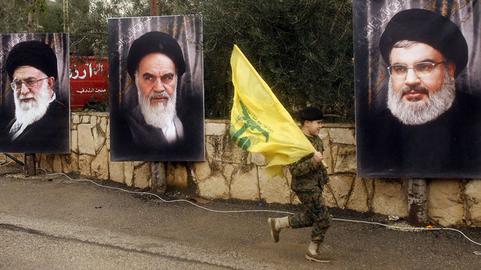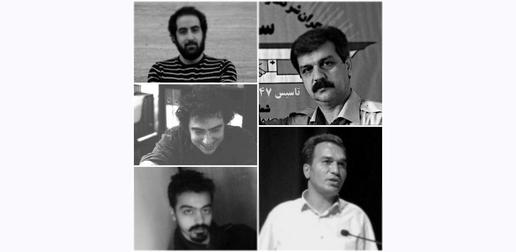On June 6 1982, in the middle of the Iran-Iraq War, the Israeli army entered southern Lebanon to expel Palestinian guerrillas who had attacked Israel from their strongholds.
After Israel’s attack on Lebanon, Iran’s Supreme Council of Defence, then the highest decision-making military body in the country, decided to deploy military forces and equipment to Syria to help the Syrian army and Lebanese Shias fight against Israeli forces. But when Ayatollah Khomeini was informed of this decision, he said that the Islamic Republic should not engage in a new military conflict before the end of its ongoing war with Iraq. He ordered those troops that had already been deployed to Syria to come back to Iran, which they did. However, a number of the Revolutionary Guards’ staff and commanders stayed in Syria near Lebanon’s borders in order to form and train a new Lebanese guerrilla force.
The Revolutionary Guards, with the help of a group of Lebanese Shia clerics who sympathized with the Islamic Republic, started their activities in southern Lebanon by providing ideological and military training to those Shia youngsters who were ready to fight against Israel. These young Shias formed the first cells of the organization that was later named Hezbollah (the army of God), although it did not have an official name for about two years. But in early 1984, the leaders of the new organization officially announced the formation of the Lebanese Hezbollah, a Shia armed force that did not recognize the Jewish state and was committed to fighting Israel.
In February 1985, Hezbollah published its manifesto, which emphasized the importance of recognizing “the legal ruling of the jurist as the source of imitation.” This phrase was a clear reference to the rule of the jury [velayat-e faqih], the ideological basis of the Islamic Republic, and the role of Ayatollah Khomeini as Hezbollah’s spiritual leader.
The Iranian Officials Who Founded Hezbollah
Ali Akbar Mohtashamipoor, who served as Iran's ambassador to Syria from 1982 to 1986, played a decisive role in orchestrating the Islamic Republic’s efforts to found Hezbollah. In many sources, he has been referred to as the founder of this Lebanese force.
Ahmad Motevaselian, the commander of the 27th Division of the Revolutionary Corps (the most important Corps’ division during the Iran-Iraq War), was the top Iranian commander to be sent to Syria to organize the military training of the new militia force.
Motevaselian and Seyed Mohsen Mousavi, chargé d'affaires of the Iranian embassy in Lebanon, worked together in summer 1982 to pave the way for the formation of the Shia force that was later known as Hezbollah. They and two other Iranian officials were kidnapped on July 4, 1982 by the Lebanese Christian allies of Israel.
Ali Khamenei, then the president and head of the Supreme Defence Council, Akbar Hashemi Rafsanjani, the then speaker of the parliament and Ayatollah Khomeini’s representative in the council, and Mohsen Rezaei, the then commander of the Revolutionary Guards, were the highest-ranking officials involved in decision-making about the formation of Hezbollah. Ayatollah Ruhollah Khomeini, despite being against Iran’s direct military confrontation with Israel, did approve of the Islamic Republic’s efforts to form Hezbollah in Lebanon and to continue Tehran’s support for this force.
How Hezbollah's Popularity was Boosted
Throughout the 1980s Hezbollah conducted a series of attacks against Israeli military staff and civilians. It also carried out terrorist attacks against Westerners and kidnapped many American and European citizens.
A number of the most famous operations allegedly conducted by Hezbollah members took place before 1984, which was before the group was officially established. For instance, in October 1983, camps of US marines and French parachutists in Beirut were destroyed by two separate car bombs that killed 241 US and 58 French servicemen. These two operations were claimed by an unknown Lebanese group that introduced itself as the Islamic Jihad Organization (this group is usually mistaken with the Palestinian Islamic Jihad group). However, there is no hard evidence to prove the existence of such a Lebanese group and many intelligence experts believe that the attacks were, in fact, conducted by the members of Hezbollah, which was backed by Syria and Iran.
The Syrian government, as the most important ally of the Islamic Republic of Iran in the Arab world, played a decisive role in supporting Hezbollah and facilitating Iran’s logistic and material support for this Shia organization. For instance, at the end of the Lebanese civil war, which lasted from 1975 to 1990 between rival Lebanese groups, the Syrian army intervened in Lebanon and disarmed almost all these groups, whereas Hezbollah was allowed to continue its activities. This development strengthened the position of Hezbollah even more, and paved the way for the group to become the most powerful force in the country in the coming years.
Under such circumstances, Hezbollah continued to fight an effective guerrilla campaign against Israeli forces in those parts of southern Lebanon that were still under Israel’s occupation. This campaign finally led to Israel’s withdrawal from Lebanon in May 2000. This withdrawal made Hezbollah and its leader, Hassan Nasrallah, extremely popular among the citizens of the Arab countries, who had never forgotten the humiliating defeats of their armies against Israel from 1948 to 1973. Israel’s withdrawal also boosted the Islamic Republic’s popularity in the Arab world, as an Islamic state that had succeeded in what no Arab state had achieved before.
Hezbollah and Iran’s popularity in the Arab world increased even more in 2006, when Hezbollah gained new victories during a 33-day war with Israel. On July 12, 2006, Hezbollah launched a military operation against Israel, killing a number of Israeli soldiers and abducting two of them. Hezbollah’s purpose was apparently to pressure Israel into releasing three Hezbollah members jailed in Israeli prisons. But this action led Israel to launch a major military offensive against Hezbollah. The conflict led to a destructive war that did not result in a military victory for either side. However, Hezbollah, with the use of Iranian rockets and missiles, did inflict considerable casualities and damage to Israeli forces, which boosted the group’s popularity, and that of Iran, throughout Arab nations.
Nevertheless, the popularity of Hezbollah and Iran in the Sunni Arab world has significantly declined since 2012, due to their intervention in Syria’s civil war in support of Bashar al-Assad.
Hezbollah and Syria’s Civil War
By late 2012 it was widely reported that Hezbollah troops had become increasingly involved in Syria’s civil war. In May 2013 Hassan Nasrallah officially confirmed Hezbollah’s involvement in the war.
Before Russia’s military intervention in Syria in September 2015, at a time when Bashar al-Assad’s regime was under pressure from Western powers and their regional allies to step down, very few international analysts believed that Iran, Hezbollah and other Iran-backed militia forces had any chance of defeating anti-Assad troops. Nevertheless, they managed to keep al-Assad in power until the Russians came to their help. Bashar al-Assad and his Shia and Russian allies gradually got the upper hand by 2017.
In May 2018, Lebanon held its first legislative election since 2009. Hezbollah and its allies secured a majority of seats, making the Shia force politically dominant for the first time. Tehran portrayed the election results as a decisive political victory for the Islamic Republic after its military achievements in the region.
However, after the relative defeat of anti-Assad forces in Syria’s civil war, Iran and Hezbollah had continued presence in the country and tried to use this presence to threaten Israel near its borders. In reaction to this threat, Israel has conducted numerous air strikes on Iran and Hezbollah’s bases in Syria. Tel Aviv and Washington have warned Tehran that they would never tolerate the military presence of Iranians and their allies near Israel borders, and that they would end this presence at any cost.
Despite Russia’s collaboration with Iran and Hezbollah in Syria’s civil war, it would appear that Moscow does not agree with the threatening presence of the Shia enemies of Israel in Syria in the aftermath of the civil war. As a result, many analysts believe that Iran and Hezbollah have no chance in maintaining their military bases in Syria, and that they will finally be obliged to seek a face-saving solution to step down from their new strategic ambitions near Israel’s north-eastern borders.
Dimensions of Iran’s Support for Hezbollah
It is no secret that Hezbollah’s weapons and funding are provided by Tehran. According to American, Israeli and Hezbollah sources, Iran has provided a wide range of rockets and missiles to Hezbollah, many of which have already been used against Israel.
On June 16, 2016, after some Lebanese banks closed the accounts of Hezbollah operatives due to US financial sanctions against the group, Hassan Nasrallah said: "All the banks of the world cannot stand as an obstacle to Hezbollah... As long as there is money in Iran, we will have money." He clearly emphasized that Iran provides money for Hezbollah’s missiles, and even the funds used for this group’s food and other supplies.
Following the 33-day war, Nasrallah said: "The Lebanon government pays 80 million liras [about US$53,000] for each destroyed house. If the cost of rebuilding the house is more than that, we will pay the excess." He added: "All the payments to those who lost their house in the war, to rent houses and buy furniture, are provided by Ayatollah Khamenei." In the following years, it was announced that Iran had built or reconstructed 670 kilometers of roads, 73 mosques, 48 bridges and 19 medical centers in southern Lebanon.
Hassan Nasrallah also stated in August 2007 that during the 33-day war, he followed the orders of Ayatollah Khamenei. In another statement in August 2006, Nasrallah had clearly said: "In case of any attack against Tehran and Damascus we will resist until the last drop of our blood."
Iran’s Supreme Leader himself admitted in February 2012: "We have intervened in anti-Israel matters, and it brought victory in the 33-day war by Hezbollah against Israel in 2006... In any place, if any nation or any group confronts the Zionist regime, we will endorse and we will help. We have no fear expressing this.”
Hezbollah, with the help of Iran, has provided an extensive social service program and runs many hospitals, clinics, agriculture complexes, sports clubs, business centers, building societies, schools, nurseries and charities throughout Lebanon. The quality of the services provided by such centers is higher than that of the average services available in the country. For instance, medical care in Hezbollah-related medical centers is often cheaper than most of the country's private hospitals.
Hezbollah also covers, with the financial help of Tehran, costs for the families of those Hezbollah members who have been killed or injured in the course of this group’s confrontations with Israeli forces.
As a result of such services, Hezbollah enjoys a very powerful social base in Lebanon. In fact, many Lebanese people, regardless of their political or even religious tendencies, take advantage of the social services provided by this group, which may be translated into political support on the occasion of campaigns and public elections.
Also in this series:
Decoding Iran's Politics: The Chain Murders of Dissidents
Decoding Iran's Politics: The Struggle Over Compulsory Hijab
Decoding Iran's Politics: Are Iran's Protests Led From Abroad?
visit the accountability section
In this section of Iran Wire, you can contact the officials and launch your campaign for various problems

























comments